Revolutionizing Level Measurement: Why Radar Non-Contact Technology is the Future
In today’s fast-paced industrial world, precision and reliability in level measurement are paramount. Whether dealing with liquids, solids, or challenging environments, radar-based non-contact measurement technology is revolutionizing how industries monitor and manage their processes. Radar level measurement has quickly become the go-to solution for companies seeking accurate, efficient, and user-friendly ways to measure materials. One such innovative solution is Jiwei radar level sensors, designed to meet the most stringent requirements of modern industries.

What is Radar Level Measurement?
Radar level measurement operates on the principle of sending microwave signals toward the medium being measured. In a typical system, the sensor emits microwaves from above the surface of the material. These signals travel until they hit the surface of the medium, where they are reflected back toward the sensor. By calculating the time it takes for the signal to return, the sensor determines the distance to the product surface and calculates the level accordingly. This process is fast, efficient, and highly accurate, making radar ideal for various industrial applications.
How Non-Contact Radar Level Measurement Works
The true power of radar level measurement lies in its non-contact nature. Unlike traditional methods, which may require physical probes to be immersed in the substance being measured, non-contact measurement technology from Jiwei eliminates the risk of contamination, corrosion, or wear caused by direct contact with materials. By simply measuring the time of flight of the microwave signal, radar systems can accurately determine the level of the product inside tanks, silos, or containers, no matter the medium.

This technology works well for both liquids and solids, ensuring versatility across a wide range of industries such as chemicals, food and beverages, oil and gas, and more. Whether you are measuring water, chemicals, powders, or even granular substances, Jiwei’s radar level meters can handle it all.
Key Advantages of Radar Level Measurement
- High Measurement Accuracy
Radar level measurement offers exceptionally high accuracy compared to other measurement methods. The technology can detect even the smallest changes in the product level, which is essential in applications where precise measurements are critical. Whether it’s measuring liquid in a tank or the level of material in a silo, Jiwei radar sensors ensure accuracy, reliability, and repeatability.

- Unaffected by Temperature, Pressure, or Dust
One of the standout features of radar level measurement is its resilience to environmental conditions. Traditional level measurement systems can be affected by extreme temperatures, fluctuating pressures, or dust and vapors in the environment. Radar technology, however, remains largely unaffected by these factors, making it perfect for harsh industrial environments. Jiwei radar level sensors maintain consistent performance even in high-pressure vessels or areas with significant temperature fluctuations.
- User-Friendly Adjustment Saves Time
Jiwei radar level meters are designed to be easy to install and adjust. With intuitive calibration and simple configuration, operators can quickly set up and fine-tune the system for maximum performance. This user-friendly adjustment feature saves valuable time, particularly in industries where downtime is costly.
- Versatility in Industrial Applications
Whether you’re dealing with liquids, solids, or even slurry, radar level sensors are highly adaptable. The technology is suitable for a wide variety of materials, including corrosive substances, granular powders, and even high-viscosity liquids. Jiwei radar sensors can be applied in various industries, including:
• Chemical Manufacturing: For precise control in mixing and storage tanks.
• Food and Beverage: To monitor ingredient levels, ensuring consistent production.
• Oil & Gas: In monitoring tanks and storage vessels for accurate inventory management.
• Cement Plants: For effective measurement of bulk materials like cement and gypsum.

- Long-Term Reliability and Low Maintenance
Jiwei radar level measurement solutions are known for their long-term reliability and low maintenance needs. Since the sensor does not require physical contact with the measured medium, there is less wear and tear on the system, reducing the need for maintenance and lowering the risk of failure.
Why Choose Jiwei Radar Level Sensors?
When choosing radar level measurement technology, it’s important to select a reliable, efficient, and innovative product. Jiwei radar level sensors provide all these advantages and more, ensuring that your industrial processes run smoothly and efficiently. The robust construction, high sensitivity, and advanced features of Jiwei sensors make them ideal for applications where precision is critical.
Jiwei radar sensors provide the highest standards of safety and performance, making them suitable for industries with strict regulatory requirements. Additionally, Jiwei’s radar technology integrates seamlessly with existing systems, offering simple installation and minimal disruption to ongoing operations.
Conclusion
Radar-based non-contact measurement technology represents a significant advancement in the field of level measurement. Jiwei’s radar sensors offer unmatched accuracy, reliability, and versatility across a broad spectrum of industrial applications. Whether you’re measuring liquids or solids, in demanding conditions or harsh environments, radar technology ensures that you can rely on consistent and precise data, all while reducing maintenance costs and operational complexity.
For companies looking to improve measurement accuracy and optimize their processes, Jiwei radar level sensors are the ideal solution. With robust features and industry-leading technology, Jiwei is setting a new standard for radar level measurement.
